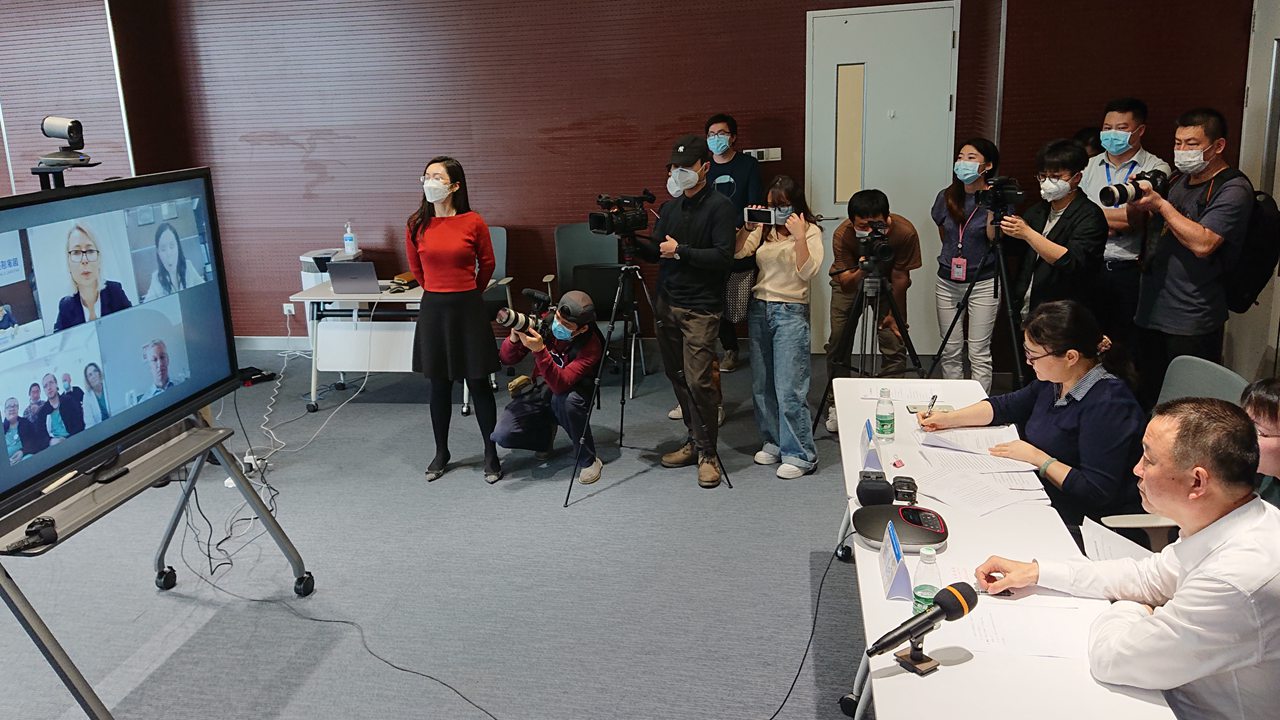SZ doctors share anti-virus experience with Polish medics
Writer: Wang Jingli | Editor: Holly Wang | From: Shenzhen Daily

Liu Lei (bottom right), president of the Shenzhen No. 3 People’s Hospital, and Yuan Jing (3rd R), director of the ICU department of the hospital, talk with peers from Poznan, Poland, during a videoconference yestersday. Liu Xudong
Shenzhen No. 3 People’s Hospital medical experts shared their novel coronavirus disease (COVID-19) prevention and control experience via a videoconference with peers and officials in Poznan, Poland, a sister city of Shenzhen, on Thursday.
This is said to be the first remote meeting Shenzhen has held to share anti-virus expertise with an international sister city since the outbreak.
Cai Ying, director of the Shenzhen Foreign Affairs Office, and Liu Lei and Yuan Jing, the hospital’s president and director of the ICU department, attended the meeting.
Six representatives from Poznan, including Mayor Jacek Jaskowiak, four doctors led by contagious disease expert Iwona Mozer-Lisewska, and Iwona Matuszczak-Szulc, head of the city’s foreign affairs office, were also in attendance.
In the videoconference, Liu and Yuan gave detailed answers to questions on epidemic prevention and control, including effective medicines, clinical diagnosis and preventative measures of frontline medics.
Yuan mentioned the role of the hospital’s strategy to categorize infected patients into four types based on severity of symptoms.
The classification allowed them to treat patients in a more targeted and effective way.
When asked about measures taken to protect frontline medics from infection, Liu said that in addition to providing high-standard protective materials, they also used medicines like thymalfasin, traditional Chinese medicine, and preventative respiratory spray to help doctors boost their immune system.
In order to cut the infection at its source, some frontline medics were also required to stay at designated hotels after work shifts, said Liu.
Cai said Shenzhen appreciates the Polish Government and people’s support for China when the outbreak was most critical, and Shenzhen is willing to offer valuable experience to help Poland win the battle.
Shenzhen has also sent to Poznan a batch of English-language brochures on the city’s experience on COVID-19 treatment, stay-at-home isolation, and prevention and control of the disease, according to Cai.
The city of Brisbane in Australia, another sister city of Shenzhen, has also extended its wish to exchange anti-virus experience with Shenzhen.
Shenzhen has offered preventative materials such as face masks and protective suits to 32 sister cities in 30 countries around the globe, according to the Shenzhen Foreign Affairs Office.
As of Thursday afternoon Poland had reported 1,085 confirmed cases and 14 deaths due to COVID-19.
China has provided assistance to 89 countries and four international organizations to fight against the novel coronavirus, the China International Development Cooperation Agency (CIDCA) said at a press conference in Beijing on Thursday.
Chinese medical workers and supplies have been sent to 28 Asian countries, 16 European countries, 26 African countries, nine countries in the Americas and 10 countries in the South Pacific, according to Deng Boqing, deputy head of the CIDCA.
China has shared with more than 100 countries its experience in the prevention and control of the COVID-19 epidemic, Wu Zunyou, an epidemiology expert at the Chinese Center for Disease Control and Prevention, said at a press conference Tuesday.
Chinese experience underlines the effectiveness of separating the source of infection and the susceptible population, he said.
Timely detection, reporting, quarantine and medical treatment have contributed to effectively reducing the source of infection in China, said Wu.
To cut off the transmission chain, Wu stressed the importance of wearing face masks, washing hands and ensuring ventilation.
China prolonged holidays and advocates keeping a certain distance between people for the good of the susceptible population, he said.
Many countries have adopted those methods in light of their conditions, Wu added.